Every detail and component of the car is vital. Each has a responsibility so huge but not as massive as the duty of the brakes.
The brakes play the most crucial role as far as automobile safety is concerned. Without the brakes, the car would simply have to rely on the friction and the time to slow down, which can be risky because of so many factors that need to be considered. As a basic expectation, brakes should be as efficient and well maintained always.
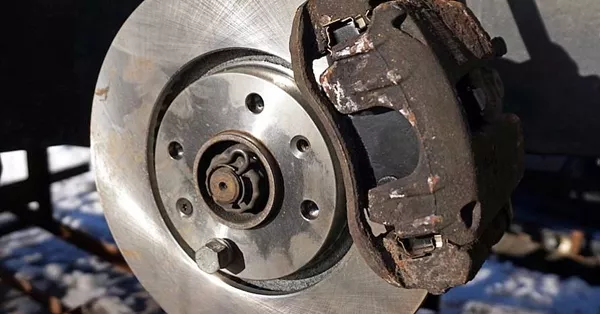
The brakes play the most crucial role as far as automobile safety is concerned
We all know that the brakes should be there, but we can actually have a greater involvement when it comes to choosing the brake type. The choice between ceramic and organic brake pads is definitely one of the most talked active discussions and which the better option is. Philkotse.com will help you decide which is the better option.
1. What are brake pads?
The brake pads are the component that contacts and puts on pressure and resistance to the car’s brake rotors. The rotors are the shiny and flat discs that can be seen partially behind the wheels of some cars. The compression and the friction that is being applied to the brake rotor can be felt when the wheels gradually slow down and halt.
Once the wheels stop turning, the car is also at a standstill. As for the brake pads, they are taking and absorbing too much stress every time the car needs to stop or slow down. It is a thankless but essential job, and the brake pads have to do it over and over again for thousands of miles.
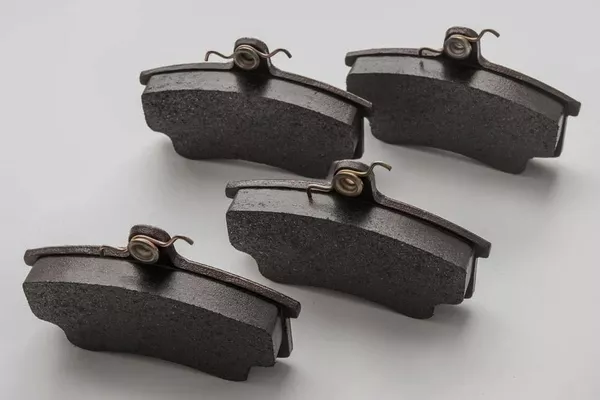
The brake pads are the component that contacts and puts on pressure and resistance to the car’s brake rotors
>>> Read more: How to change your car's brake pads properly?
2. Organic brake pads
Usually called non-asbestos brake pads, these are typically made from glass and rubber alongside resins that can endure high heat. Basically, the materials are all-natural, thus the name. The high heat actually helps bind and hold the brake pads together.
Most brake pads are made of Kevlar, and one good thing about this material and other components of organic brake pads are their materials don’t pollute as they are subjected to wear. Disposing of them is more comfortable too.
Organic brake pads are known to be softer and quieter but because of this, expect them to wear out faster. Although they don’t contribute to the pollution aspect, their dust production is rather high. Organic brake pads are best for small cars without aggressive driving or the substantial long-distance travels.
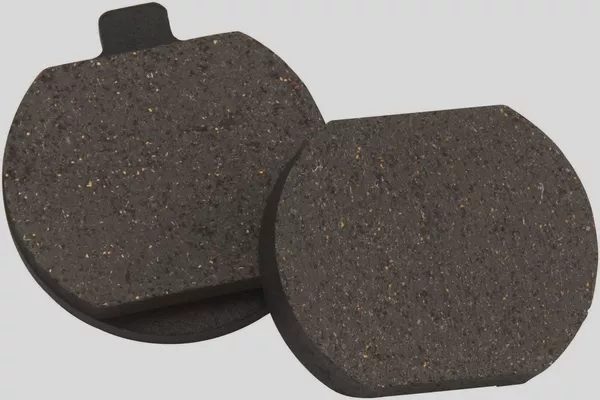
Organic brake pads are typically made from glass and rubber alongside resins that can endure high heat
Pros of organic brake pads
- They are budget-friendly and cost-effective. This is mainly due to the fact that its raw materials and the overall manufacturing process are cheaper.
- Organic brake pads are designed for lightweight vehicles, and nearly all cars in the US use this. It is best for normal driving conditions.
- They are almost soundless, and it doesn’t put out a lot of pressure on the rotor brakes. As everything else, wear and tear can cause the rotor to crack and eventually break and getting this fixed is one huge dent on the budget.
>>> Check out: 6 signs showing that your car's brake system needs maintenance.
Cons of organic brake pads
Like any other component, organic brake pads also have its cons:
- Organic brakes would be needing time to cool down after use. They are not expected to work well in high-temperature ranges thus are not recommended for high-performance vehicles.
- Extreme weather conditions can also affect their effectivity and performance
- Organic brakes are compressible, so the additional force is needed to engage and trigger them. This usually results in spongy brakes.
- These non-asbestos brake pads aren’t exactly the best when it comes to durability, so replacing them every so often is necessary.
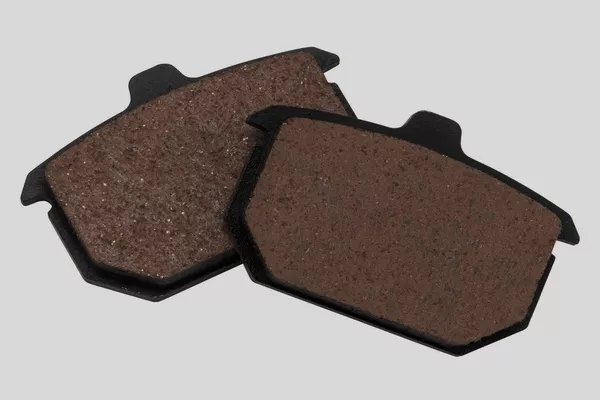
Organic brake pads are budget-friendly and cost-effective
3. Ceramic brake pads
Ceramic brake pads, on the other hand, are made from bonding agents, ceramic fibers, and filler material. Copper fibers, in small amounts, are also incorporated and weaved in its production. These materials are the same resources used for plates and mugs.
Automobile reviews and studies show that ceramic brake pads meet and exceed all the standards when it comes to durability, noise and stopping distance. A lot of sports cars that are regularly driven hard like in club racing would usually opt for ceramic brake pads than the organic ones.
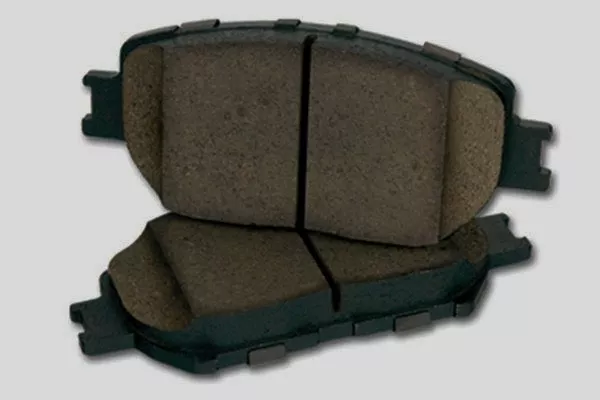
Ceramic brake pads are made from bonding agents, ceramic fibers, and filler material
>>> Also check: These 7 habits of car owners are awfully damaging their brakes.
Advantages of ceramic brake pads
A lot of people prefer to use ceramic brake pads because of the following reasons:
- Due to its material, ceramic brake pads dissipate heat very well; thus, it provides a stronger and longer performance even after several stops.
- Ceramic brake pads are stronger; therefore, they produce less dust compared to organic ones. The dust it does produce is also lighter in color and will not stick to the wheels.
- It is even more rotor-friendly because it is less abrasive thus while ensuring the safety of your brakes, you also won’t need to worry about the serious damage that it can cause to the rotors, which can be quite costly.
- Ceramic brake pads produce minimal to zero noise as well.
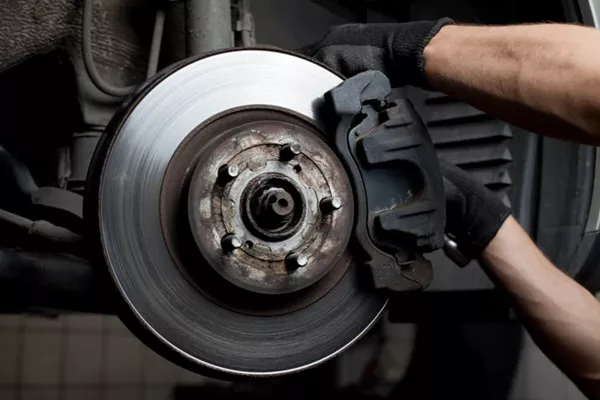
You know what, brake pads are super important to the car!
Disadvantages of ceramic brake pads
As far as the disadvantages are concerned, in fact, ceramic brake pads have some under its name:
- It is expensive. This is due to the material and the process that it has to undergo.
- Ceramic brake pads are not the best option if you are living in regions where weather conditions are extreme – too much heat and too much cold is not something that ceramic brake pads can grow accustomed to.
- It’s not recommended for larger vehicles like a truck or an SUV as it is not as strong as metallic brake pads, but ceramics are definitely stronger than the organic ones.
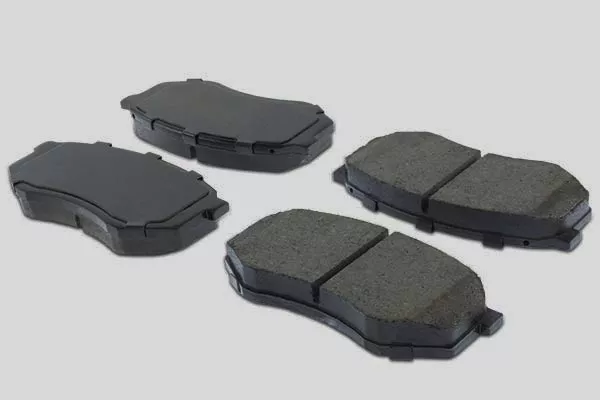
Ceramic brake pads are stronger; therefore, they produce less dust compared to organic ones
>>> Very important: Do’s and Don’ts when car brakes fail.
In conclusion, both ceramic and organic brake pads have their own strengths and opportunities. Both are best for lightweight up until normal-sized cars only as performance might be compromised with more substantial cars. The most significant factor to be considered for those wanting to decide which one is better is their lifespan and cost.
If you want a brake pad that can last you for a little time but is relatively friendly on the pocket, then organic brake pads are the best for you. If you drive very almost every day and would like your brake pads to last longer, then ceramic is the smarter option for you. The choice is basically down to your driving habits and preferences.
Visit us at Philkotse.com for more helpful car tips and advice,
Recent posts
- Safety tips: How to drive when your car brakes are malfunctioned Nov 30, 2022
- 7 steps to deal with the car brake noise Nov 30, 2022
- Things you might not know about brake pads and car rotors Jan 30, 2021
- Disc Brakes vs Drum Brakes: How are they different? Jan 28, 2021
- Pros & Cons of DIY car brake replacement Aug 16, 2022












